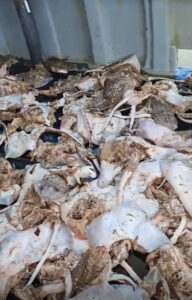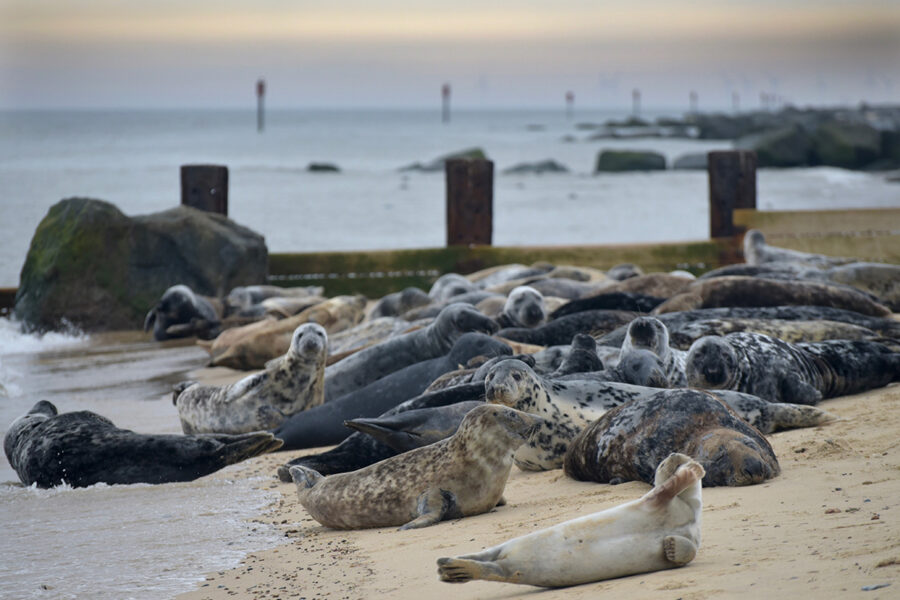‘Important tourist attraction’ says London MP, as disconnect with reality of life at sea becomes ever starker

Under intense pressure? Was
the MP for Richmond Park talking about seals, or the fishermen who are being put out of business by the huge increase in seal populations documented in the southern North Sea? Seal damage such as this, once an occasional occurrence in the skate net fishery in the South East, is now making it unviable, threatening the livelihoods of fishermen in the region who have long relied on it as part of their seasonal fishing patterns
While fishermen continue to document the increasing levels damage done to their catches by booming seal populations, making many traditional net fisheries unviable, MPs representing English constituencies made impassioned calls for more protection of seals in a recent Commons debate.
Sarah Olney, the London- based MP leading the debate, said: “Without protection, some seal colonies will be abandoned, costing communities money and throwing the local ecosystem into chaos. Like most British marine life, seal populations are under intense pressure.”
Several MPs called for the government to amend the Wildlife and Countryside Act 1981 to make ‘the intentional or reckless disturbance of seals’ an offence.
This would give seals the same protections as whales and dolphins, and would bring England and Wales into line with existing seal protection legislation in Northern Ireland and Scotland.
Legal protection banning disturbance of seals ‘would safeguard the current economic benefits brought by these creatures and encourage further responsible, sustainable seal- based tourism’, said Sarah Olney.
She said nearly 80,000 people a year are estimated to visit the seal colony at Horsey in Norfolk, while ‘certain seals in Devon have developed a cult following among tourists, with their own social media pages and supporter groups’. Duncan Baker, the Conservative MP for North Norfolk, noted that his constituency has some of the largest seal colonies in Europe, and that 3,000 pups are born each year off Blakeney Point.
Former fisheries minister George Eustice, highlighting the work of the Seal Research Trust in Cornwall, said that at Mutton Cove, there was ‘a fantastic number of seals and some great work is done’.
He also said that as well as the MMO potentially having powers to introduce byelaws, the IFCAs could also do so. “Rather than having an offence for disturbance, it might be better to create an obligation on certain marine agencies to give consideration to seals when designating byelaws,” he said.
Report soon on acoustic deterrents
Fisheries minister Mark Spencer said the MMO and the fishing industry had been working together on ‘promising’ trials with acoustic seal deterrent technology and that a report would be published ‘shortly’.
He said the UK government had ‘a strong track record’ in protecting and managing marine species.
“I fully acknowledge the fishing industry’s expertise and stewardship of the marine environment,” he told MPs.
“I recognise its concerns about the potential impact of environmental protections on livelihoods.”
He said seals are important in the marine ecosystem, but are threatened by ‘pollution, entanglement, marine plastic and debris, climate change and disturbance from human interaction’.
Legal protection of seals includes the Wildlife and Countryside Act 1981, Conservation of Habitats and Species Regulations 2017 and the Conservation of Offshore Marine Habitats and Species Regulations 2017, which make it an offence to capture or kill a seal.
Together with the Seal Alliance, Defra launched the ‘Give Seals Space’ campaign in 2021, to help to raise awareness of the impact of disturbance on seals.
“The government recognise that seals interacting with fishing gear and eating fish can be a problem for some sections of the fishing industry,” said the minister.
He said that in 2022 the UK government and devolved administrations published the marine wildlife bycatch mitigation initiative. “This sets out how we will work collaboratively with the fishing industry and stakeholders to minimise and, where possible, eliminate the bycatch of sensitive marine species.
“Defra also worked alongside the MMO to fund the development of non-lethal methods to help prevent negative seal/fishery interactions and costly damage to fishing gear.”
The MMO has been working with the fishing industry to test the use of targeted acoustic startle technology as a seal deterrent, and the work was yielding ‘promising results for limiting seal interactions for specific fisheries’.
“A full report on that is due to be published shortly, and we are considering the next steps that we can take to address the issue under the Clean Catch UK programme.
“I am proud that the UK is a leading voice for the protection of marine mammals internationally,” said the minister.
This story was taken from the latest issue of Fishing News. For more up-to-date and in-depth reports on the UK and Irish commercial fishing sector, subscribe to Fishing News here or buy the latest single issue for just £3.30 here.
Sign up to Fishing News’ FREE e-newsletter here.








